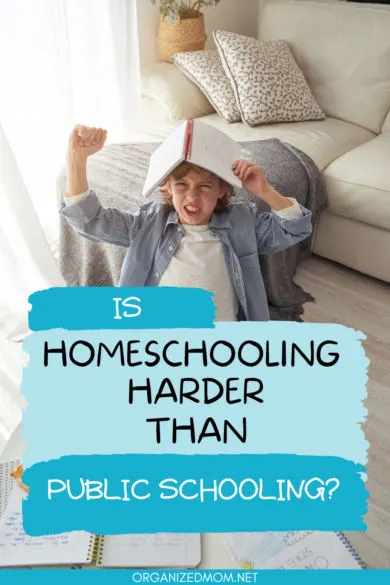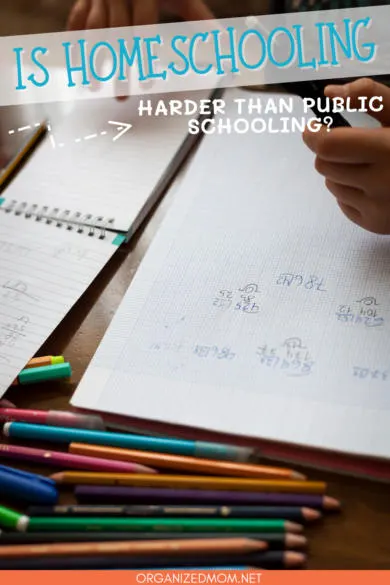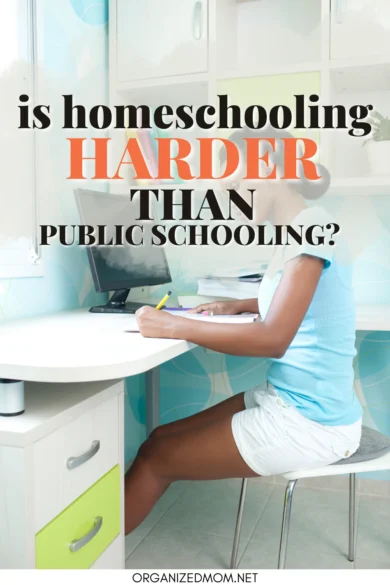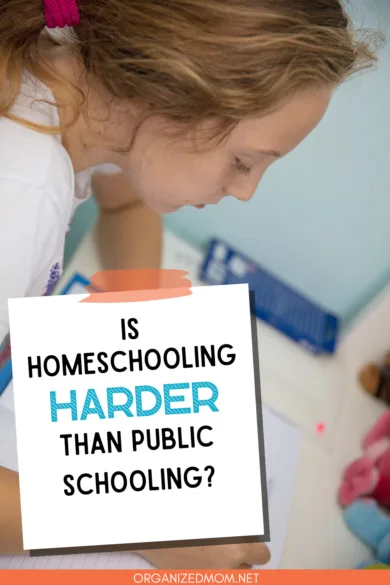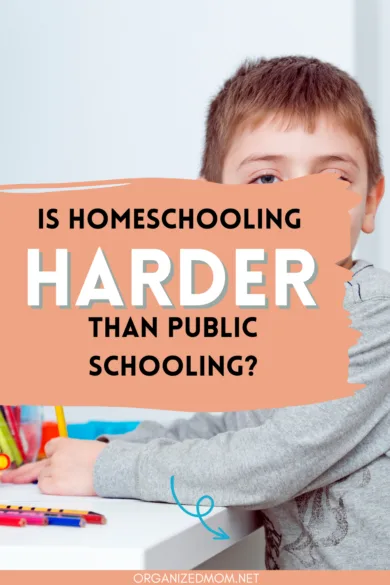With over 2.5 million children in the United States being homeschooled, this number only continues to rise rapidly. Homeschooling has become the most popular alternative to public schooling, and the students often fare better academically. Is homeschooling harder than public schooling?
Homeschooling is seen as being much harder than public schooling, as it has its own set of challenges both for the children and the parents educating them. Homeschooling poses many challenges, including financial, social, school structure, responsibility, and commitment to education.
Homeschooling can be more challenging than public schools for various reasons in many different contexts. If you’re thinking about starting homeschooling, read this first!
Is A Homeschool System Harder Than A Public School System?
The most common reason for more and more parents deciding to switch to homeschooling is the concerns surrounding the environment of public schools.
Kids are peer pressured, bullied, or excluded from groups, influencing their ability to learn and maintain a stable sense of emotional stability.
Homeschool laws are separate from public and private school laws. Homeschooling parents do not need higher education degrees in teaching to qualify to teach their children.
Homeschooling is popular for children before high school, as the complexity becomes more intense when the child needs to start high school.
To answer the questions better about whether or not homeschooling is harder than public school, we have conducted a list of all the challenges of homeschooling for both parents and learners.
Why Homeschooling Is Harder Than Public Schooling
Homeschooling can be much harder than public school for many reasons. Although these reasons may not all be applicable in everybody’s situations, they are worth noting, as public schools do not have these difficulties:
Homeschooling Do Not Offer Music Or Sport Programs
Most public schools offer students sports programs and other elective options such as music and art. These programs may not be made available to homeschool students.
This leaves parents paying extra for their homeschooled children to participate in extracurricular activities that would have been included in a public school’s monthly fare or budget.
Homeschooling Is More Expensive Than Public Schooling
Public school is cheaper than homeschooling. It’s not uncommon to spend up to and more than $1,000 on a homeschool curriculum, which will exclude any other homeschooling or stationery supplies.
When you attend a public school, you only have to purchase supplies once or twice a year, and they provide you with a list of all the things you need.
You can also pack your child’s lunch to save more money in a public school. Another downside to homeschooling is that one parent needs to make homeschooling their child or children a full-time job and concern.
This could make it extremely challenging for a single parent to succeed in homeschooling. Additionally, homeschooling may strain a family’s finances, as one parent in a two-parent household will need to put their career aside to educate their children.
Public School Teachers Are More Experienced With Educating
Public school teachers are required to carry advanced education degrees and will also have much more experience working and teaching children of all ages.
Parenting a child and teaching them simultaneously could be extremely difficult for parents, and many of them struggle to do both.
Homeschooling Authority Is Less Than In Public Schools
Public schools are known for their fixed structure and authority. This is not the case when it comes to homeschooling, as a problematic child may develop behavioral issues and struggle to respect their parent as a teacher.
This could also make homeschooling an ineffective learning environment, as a parent won’t necessarily know how to punish their child if they refuse to do their schoolwork.
Homeschooling Doesn’t Offer Many Social Opportunities
Children who attend public schools for their entire school duration have many opportunities for different social interactions in different contexts. This includes sports, teamwork exercises, and group tasks.
Although there may be homeschool co-ops and opportunities for extracurricular activities in your area that could help with social interaction, a public school has endless built-in social benefits.
Homeschool Doesn’t Always Allow Independence
Public schools will teach learners a certain degree of independence. Depending on each child’s grade, they will need to keep track of their class schedules, get to one class from another, buy their lunch, and maybe even use public transport from and to school.
This is not the case with homeschooling, and it could cause a child to become underdeveloped in society as they age.
Homeschooling Requires Commitment And Consistency
Homeschooling will require a significant amount of commitment and consistency on the part of the parent and the learner.
The parent will be held solely responsible for keeping a disciplined class schedule. This schedule needs to cover several subjects while they ensure the child fully grasps the entire curriculum for each of them.
It is the child’s responsibility to know that they cannot switch off at home, and every day should be handled as a normal school day.
Homeschooling May Lack Resources
Homeschooling can also become much more difficult than public schooling due to a lack of resources. A public school is fully equipped with a computer lab, art studio, libraries, and more.
When you practice homeschooling, you will need transport to the library, field trips, and any other extra things you will need that you could find and need in a public school system.
Homeschool Lacks Self-Esteem-Building Opportunities
One downside to homeschooling that many people fail to consider is that homeschooled learners may lack award ceremonies and other self-esteem-building opportunities.
These ceremonies and awards in public schools are crucial motivators for positive feedback for students flourishing in their subjects.
Parents of homeschoolers will need to create or find an alternative solution to implement these opportunities, as a child could become unmotivated and uninterested.
Homeschooling Does Not Have A Built-In Structure
School children, especially teenagers, will thrive on a fixed routine. Where each public school has a built-in structure, things are much more complex with homeschooling.
Conclusion
Of course, there will be workarounds and solutions to these factors that could make homeschooling more difficult than public schooling. Homeschooling will not work for all types of learners, and it should be carefully debated and considered.
